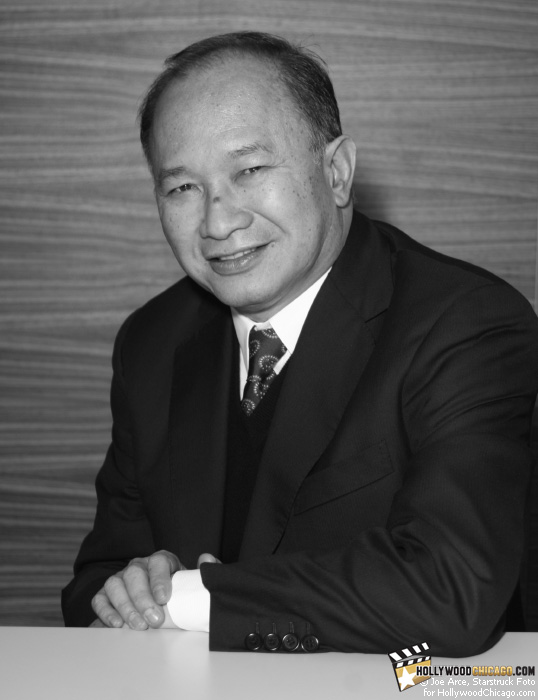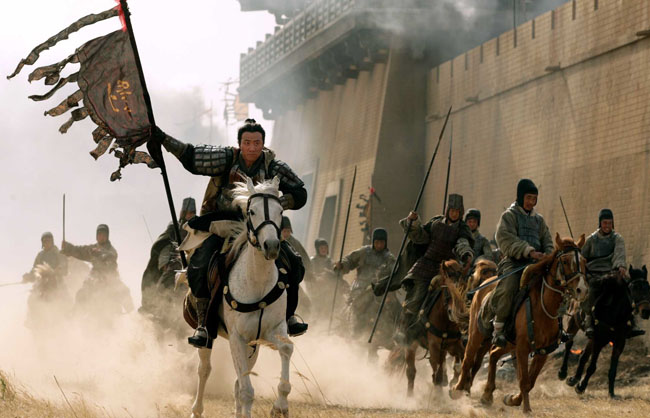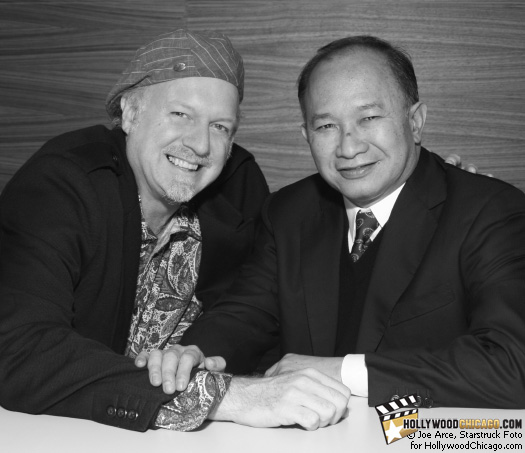CHICAGO – Patrick McDonald of HollywoodChicago.com appears on “The Morning Mess” with Dan Baker on WBGR-FM (Monroe, Wisconsin) on March 21st, 2024, reviewing the new streaming series “Manhunt” – based on the bestseller by James L. Swanson – currently streaming on Apple TV+.
Interview: Director John Woo on His ‘Red Cliff’ Premiere at the 2009 Chicago International Film Festival
CHICAGO – John Woo, whose mastery of the action movie was once compared by director Sam Raimi to the suspense mastery of Alfred Hitchcock, premiered his new film, “Red Cliff” at the Chicago International Film Festival on October 9th.
Known primarily for his Hong Kong guns-and-gangster epics like “The Killer” (1989), “Hard Boiled” (1992) and “Bullet in the Head” (1990), Woo came to America in 1993 for his memorable turns in “Broken Arrow” (1996), “Face/Off” (1997) and “Mission Impossible II” (2002). He returns to his native China for the historical drama Red Cliff.
 Photo credit: Joe Arce of Starstruck Foto for HollywoodChicago.com |
Red Cliff is the story of the “Three Kingdoms” of China in 208 AD, and the war between them that changed history for its country and people. It has a broad and epic scope, beautifully composed, with a sweep and acting passion worthy of David Lean.
Before his exciting Red Carpet premiere at the Chicago International Film Festival, John Woo sat down with HollywoodChicago.com to give his unique and spiritual worldview on his art, and what he learned about the art of war in rendering his vision.
HollywoodChicago.com: Which great war movies did you think about when you applied yourself to the task of creating Red Cliff and why?
John Woo: ‘Lawrence of Arabia’ and ‘The Longest Day.’ I also used Stanley Kubrick’s ‘Spartacus’ and Akira Kurosawa’s ‘Seven Samarai’ as a reference. I’ve always wanted to make a movie like those and I had the opportunity with Red Cliff.
HC: In applying all the thought and work that went into Red Cliff, what did you learn about the Art of War?
JW: You need a lot of cleverness and teamwork, that’s what I learned. In the film, we had what we called the “turtle” formation, which was a battle technique. But it was a combination of my idea, inspired by what is in the book ‘The Art of War.’ When I looked at the turtle shells, that is when I got the idea.
HC: Women play a significant role in this story, understanding and using the power of their sex in many unique ways. What status for women did you want to convey in Red Cliff?
JW: The female role wasn’t that big from the book we based the screenplay on. It was my idea to expand the Princess spy character, to show the classical woman, to show her strength and ability. She has a iron will and loves her country.
This is different from typical historical Chinese films. Women are more subtle, in the background and left behind. The whole film is about teamwork and I wanted to make the women part of the team.
 Photo credit: © Magnet Releasing |
HC: You use Computer Generated Images (CGI) to create scale and perspective in Red Cliff. What is the future of film technology for use in re-creating historical drama and what do you think filmmakers have to be careful of when using CGI?
JW: CGI really helped in creating the scenic and beautiful imagery in the film. But the key is to use it, but not overuse it. I didn’t want the audience thinking it was just another CGI movie.
What the visual effects team did was make it hard for the audience to distinguish between what was CGI and what is real. They combined it very cleverly.
The carrier pigeon flight scene, I was told, was the most expensive CGI sequence in film history. It was 2-1/2 minutes long, with three locations to coordinate and the camera keeps moving.
HC: This is your first Chinese film since 1993. How do you think the art and the people of China have changed?
JW: The country is changing in a good way. Because I care about China, I love China, I want to see the country get better and better. I was touring in Bejing a few years ago, there after a long absence. I was quite amazed to see many happy faces. The young people all are smiling and realizing they have hope and a better future.
You can talk all you want about the situation, but honestly I’ve gotten great support from the government and they never interfered with what I was doing. I felt free to make my own movies. But as far as where China needs to go, there is always work to be done.
HC: When you are working with western or American actors, what are the main differences in approaching them – as compared to their Asian counterparts – when you need to adjust a particular scene or acting moment?
JW: It’s not different working with the actors. My character is I never like to speak much. But I need to find a way to communicate. I like to spend time with my actors, either Asian or American, to get an idea about how they are feeling about the film. During the conversation I will try to find out their specialty, their special qualities.
I want the story to take care of the actors. I want the feeling in the script to make them feel that they are comfortable and allow them to act as themselves. I make sure, for example, to use proper camera angles to capture their good moments, their specialty.
For example, when I was working with John Travolta and Nicholas Cage in “Face/Off,” we would just have little chats about each scene, and built a confidence with each other. We would have a rough rehearsal, then I would let them rest while I set up the camera. Then they would come out, and we wouldn’t have to say anything, because what they did was exactly what I expected. It became like we knew each other for a long time.
 Photo credit: Joe Arce of Starstruck Foto for HollywoodChicago.com |
HC: You are renowned and admired for being one of the great action filmmakers. What fascinates you most about the human being behind the gun?
JW: I never like violence. People need to be protected, not to be killed. I try to protect also the people behind the gun. Even though I’ve made a lot of action movies, I try to make it anti-violence and in the case of Red Cliff, anti-war.
HC: Your film ‘1949’ was canceled right before it was to go before the lens. Given your personal family history with the events that were to be depicted in that film, what did you get out of the film in pre-production?
JW: The year 1949 has so many different meanings for the people of China. There was suffering, pain and people forced to leave the country. In the case of my family, we moved to Hong Kong.
I feel no matter what happened, China is still a country I love. And even though that era happened, the country is still a family, despite different opinions, different lifestyles and different politics.
 | By PATRICK McDONALD |


